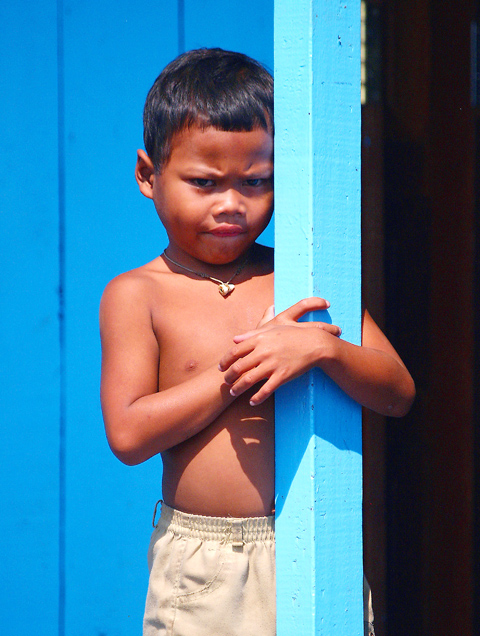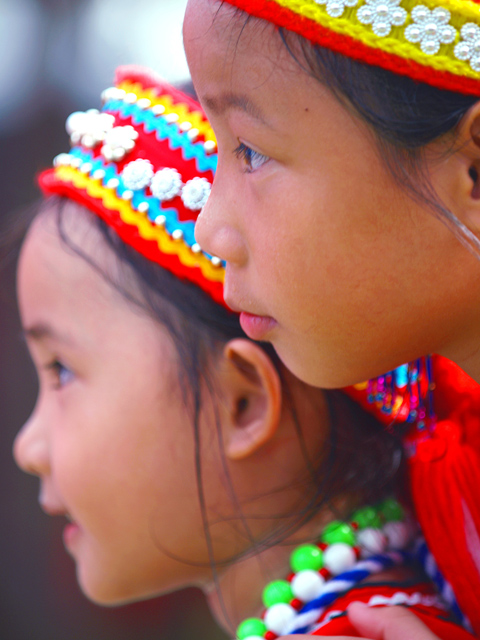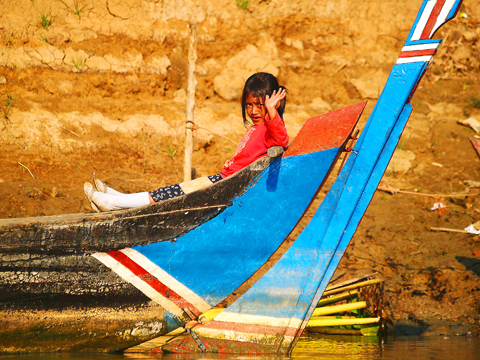German photographer Dirk Diestel has become a well-known figure in Taipei's expatriate community in the past three years, snapping pictures at chamber of commerce balls, school fairs and charity events. His work frequently appears in the Community Service Center's Centered on Taipei magazine and he has gained a reputation for photos of Taipei that are perfect for gifts.
But what Diestel really likes to do is take off in the mornings on his 500cc motorbike, camera bag secured in a box on the back, and go exploring. The motorbike gives him the freedom to go anywhere and stop anywhere. The 53-year-old says he’s having the best time of his life.
He and his wife Kathrin were living in Ueberlingen, near Lake Constance, where he owned two portrait studios and several photo stores, when she got an offer to be the principal of the German elementary school at the Taipei European School. So in 2005 they moved to Taipei with their three-year-old twins, and Diestel became a house-husband, looking after Jakob and Justus.

PHOTO: COURTESY OF DIRK DIESTEL
Living in Taipei has given the Diestels the opportunity to explore Southeast Asia on vacation, and results are now on display at the German Cultural Center Taipei until June 13. The Children of Asia exhibition, a collection of some 100 pictures, was timed to coincide with International Children’s Day on June 1.
It is not a “commercial exhibition,” he said, “it’s from the heart.”
Every photographer has their own style, and for Diestel it is portraits.

PHOTO: COURTESY OF DIRK DIESTEL
“Portraits are very natural and that’s what I like,” he said.
He also favors a telephoto lens, which allows him to stay in the background so his subjects forget he is there.
“The first view should go to the face — that’s why telephoto lens with a wide aperture is good. It’s impossible to get natural photos if you get up close,” he said.

PHOTO: COURTESY OF DIRK DIESTEL
Diestel left high school a year before graduation, determined to become a photographer. But it took almost eight years before he earned the Masters diploma from the Handworkers guild that was required to legally open a studio.
“The old system in Germany to become photographer, you must find a studio to apprentice at … and must learn for three years before taking the basic photographer exam. But without an apprenticeship, if you don’t have the schooling, you must wait six years [to sit the exam],” he said.
“After the first exam, I then joined the course for [the] Masters, three days a week and Saturdays,” he said. “It was expensive to do but necessary.”
“After one-and-half years I applied for the Masters diploma,” he said, adding that the usual time between the two exams was three years, and that he had just bugged the guild to let him take the exam earlier. “Two weeks before the exam I got permission to sit for it.”
Diestel knew very early on that he wanted to be a photographer. He got his first camera, “a very cheap box camera from Agra” when he was “8 or 10.” At 15 he got a part-time job to save money for a single-lens reflex camera. Once he had that camera, he started trying to sell his photos to local newspapers and magazines. His first published photograph was of three old Mercedes parked in front of a gas station.
“My press experience is why I like to take these photos of children and adults. I never liked to work in the studio as much. I like to work outdoors,” he said.
But it was a more recent experience that left a mark on Diestel, and provided the impetus for Children of Asia.
In the sky over Ueberlingen on July 1, 2002, a Bashkirian Airlines charter flight packed with Russian children headed for a Spanish holiday collided with a DHL International cargo jet, killing all 71 people aboard the two planes.
“I had just gotten home from a long day, went upstairs to see my sons. I had picked up one son and was holding him when I saw a big explosion in the sky through the window. I handed my son to my wife, ran downstairs, grabbed my camera and went out. I was the only photographer there [initially]. It was worst thing I had ever seen, children on the ground naked. I couldn’t take their photos, only the fire trucks, the parts of the airplanes,” he said. “My twins were six weeks old at the time. Maybe this is why I like to take pictures of children now.”
Getting a great shot is as much about luck as it is timing, Diestel said, with a large dose of patience thrown in.
His wife must also have patience, to go on vacation with a working photographer, especially with two young boys in tow.
Diestel laughingly admitted that being married to a photographer has been hard on his wife. That’s why on one trip to Vietnam he rented a motorbike to go into the mountains on his own, leaving the family behind to enjoy the beach.
“To be at the right place, at the right moment, sometimes it is just five seconds, sometimes I wait half an hour,” he said.

Dissident artist Ai Weiwei’s (艾未未) famous return to the People’s Republic of China (PRC) has been overshadowed by the astonishing news of the latest arrests of senior military figures for “corruption,” but it is an interesting piece of news in its own right, though more for what Ai does not understand than for what he does. Ai simply lacks the reflective understanding that the loneliness and isolation he imagines are “European” are simply the joys of life as an expat. That goes both ways: “I love Taiwan!” say many still wet-behind-the-ears expats here, not realizing what they love is being an

Every now and then, even hardcore hikers like to sleep in, leave the heavy gear at home and just enjoy a relaxed half-day stroll in the mountains: no cold, no steep uphills, no pressure to walk a certain distance in a day. In the winter, the mild climate and lower elevations of the forests in Taiwan’s far south offer a number of easy escapes like this. A prime example is the river above Mudan Reservoir (牡丹水庫): with shallow water, gentle current, abundant wildlife and a complete lack of tourists, this walk is accessible to nearly everyone but still feels quite remote.

Google unveiled an artificial intelligence tool Wednesday that its scientists said would help unravel the mysteries of the human genome — and could one day lead to new treatments for diseases. The deep learning model AlphaGenome was hailed by outside researchers as a “breakthrough” that would let scientists study and even simulate the roots of difficult-to-treat genetic diseases. While the first complete map of the human genome in 2003 “gave us the book of life, reading it remained a challenge,” Pushmeet Kohli, vice president of research at Google DeepMind, told journalists. “We have the text,” he said, which is a sequence of

It’s a bold filmmaking choice to have a countdown clock on the screen for most of your movie. In the best-case scenario for a movie like Mercy, in which a Los Angeles detective has to prove his innocence to an artificial intelligence judge within said time limit, it heightens the tension. Who hasn’t gotten sweaty palms in, say, a Mission: Impossible movie when the bomb is ticking down and Tom Cruise still hasn’t cleared the building? Why not just extend it for the duration? Perhaps in a better movie it might have worked. Sadly in Mercy, it’s an ever-present reminder of just